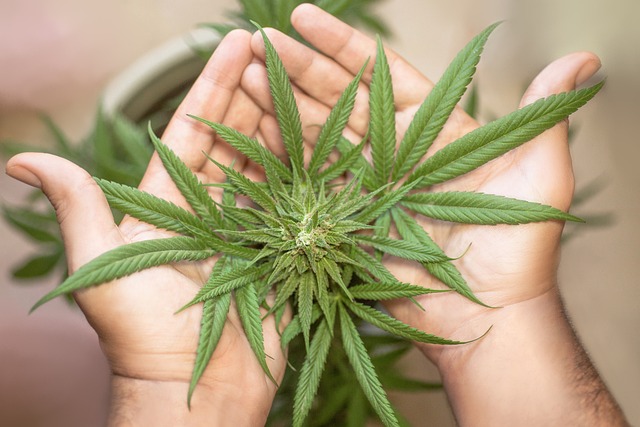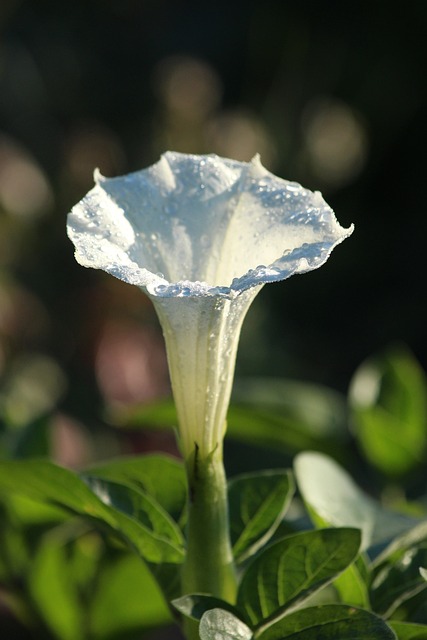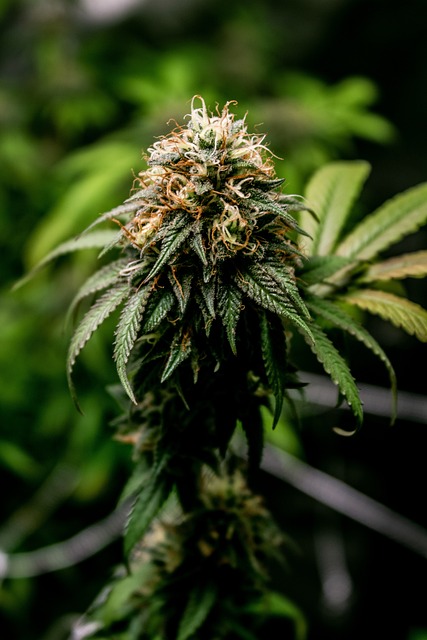THCA, a non-psychoactive compound found in cannabis with potential therapeutic benefits such as pain relief and anti-inflammatory properties, is also known to have side effects like dizziness, dry mouth, and anxiety. It's important for consumers to use THCA responsibly and within their tolerance levels to minimize adverse effects. In Georgia, THCA flower is legal under the 2018 Farm Bill and state laws, provided it contains less than 0.3% THC on a dry weight basis as part of the Georgia Industrial Hemp Program. However, due to evolving federal and state regulations, individuals must stay informed about the latest legal status of THCA in Georgia. The Georgia Department of Public Health has guidelines for safe use, and research into THCA's health applications is ongoing within this regulated environment. HB 324 legislatively recognizes THCA for medical use in Georgia, allowing qualifying patients with a physician's recommendation to use it, while cautioning against high doses that may induce mild psychoactive effects or exacerbate side effects. Residents interested in the benefits of THCA are encouraged to consult healthcare professionals and follow state regulations for safe and legal use.
Exploring the intricacies of THCA flower side effects and their legality within Georgia’s framework provides a nuanced view of this cannabinoid’s role in health and well-being. This article delves into the implications of THCA usage, offering insights tailored to Georgia’s unique regulatory environment. As we navigate the therapeutic potential and effects of THCA flowers, residents of the Peach State can gain a clear understanding of how this cannabinoid fits into their daily lives within the bounds of the law.
- Exploring THCA Flower Side Effects and Legality in Georgia
- Understanding the Impact of THCA on Health and Well-being with a Focus on Georgia's Regulations
- Navigating the Effects of THCA Flowers: A Comprehensive Guide for Residents of Georgia
Exploring THCA Flower Side Effects and Legality in Georgia

When examining THCA flower side effects, it’s crucial to understand that Tetrahydrocannabinolic Acid (THCA) is the non-psychoactive precursor to THC, the primary psychoactive component of cannabis. Consumers interested in THCA often do so for its potential therapeutic benefits, which may include pain relief and anti-inflammatory properties. However, like any substance, it can elicit side effects in some individuals. Commonly reported side effects include dizziness, dry mouth, and anxiety. These reactions can be mitigated by adhering to proper dosage guidelines and individual tolerance levels.
In terms of legality, the status of THCA flower in Georgia is subject to change as laws evolve. As of the knowledge cutoff date, products derived from hemp that contain less than 0.3% THC on a dry weight basis are legal under the 2018 Farm Bill and corresponding state legislation. This includes THCA flower, provided it meets the federal and state legal thresholds for THC content. However, it’s essential for consumers to stay informed as state laws can be complex and may differ from federal regulations. In Georgia specifically, the Georgia Industrial Hemp Program regulates hemp-derived products, including THCA flower, ensuring they are legally sourced and distributed within the state’s boundaries. Users are advised to consult local regulations and legal guidance to ensure compliance with current laws.
Understanding the Impact of THCA on Health and Well-being with a Focus on Georgia's Regulations

In recent years, there has been growing interest in the potential health benefits of THCA, or tetrahydrocannabinolic acid, a non-psychoactive compound found in the cannabis plant. THCA is often cited for its anti-inflammatory and neuroprotective properties, which may contribute to a range of therapeutic applications. As research continues to evolve, individuals are increasingly exploring how THCA can be incorporated into their wellness routines. In Georgia, where THCA has been legalized under specific conditions, the focus has shifted towards understanding its impact on health and well-being within the framework of state regulations. The Georgia Department of Public Health provides guidelines that delineate permissible uses of cannabis derivatives containing THCA, ensuring that consumers have access to safe and regulated products. This regulatory environment allows for scientific scrutiny and clinical trials to flourish, potentially leading to new therapeutic options. For those in Georgia considering the use of THCA-rich products, it is crucial to stay informed about both the empirical data emerging from research and the evolving legal landscape. As THCA legal in Georgia, consumers are encouraged to follow state guidelines and consult healthcare professionals when integrating these products into their health regimen. The potential benefits of THCA, coupled with a clear regulatory framework, offer a promising avenue for exploring its effects on health and well-being within the state’s borders.
Navigating the Effects of THCA Flowers: A Comprehensive Guide for Residents of Georgia

Though tetrahydrocannabinolic acid (THCA) is a non-psychoactive compound found in cannabis plants, understanding its legal status and potential effects is crucial for Georgia residents interested in exploring its benefits. As of the knowledge cutoff date, THCA-rich flowers are legally permissible within the state’s borders for medical purposes. Under Georgia’s HB 324, qualifying patients with a recommendation from a licensed physician can possess and use cannabis oil containing THCA, which is believed to offer therapeutic properties without the high associated with its psychoactive counterpart, THC.
For those considering incorporating THCA flowers into their wellness regimen, it’s important to be aware of the potential side effects. These may include mild psychoactive effects in some individuals, though typically these are less pronounced than with THC. Other reported side effects can encompass dry mouth and eyes, dizziness, anxiety, or paranoia, particularly at higher doses. Consumption should be approached with caution, as individual responses to cannabinoids can vary significantly. Georgia’s legal framework provides a pathway for patients to explore the potential health benefits of THCA while ensuring access within the confines of state law. Always consult with healthcare professionals and adhere to dosing guidelines when using THCA flowers or products to navigate their effects responsibly.
In conclusion, the exploration of THCA flower side effects and legality in Georgia has shed light on a nuanced topic that intertwines health considerations with legal frameworks. It is clear that understanding the impact of THCA on health and well-being is crucial for Georgia’s residents, as they navigate its use within the state’s evolving regulations. This comprehensive guide aims to provide clarity on the matter, emphasizing the importance of responsible consumption and adherence to local laws regarding THCA legality in Georgia. As research continues to unfold, staying informed about both the potential benefits and side effects of THCA flowers remains essential for individuals considering their use.
